Redditor Asks If He Is Wrong For Expecting His Family Not To Contradict His Puppy Training Methods
When you first get a puppy, it's perfectly normal for them to jump up at you when you greet them, feed them, or leave them alone. However, as they get older, excessive begging, nudging, whining, barking, jumping on furniture, and bringing you toys may be signs of attention-seeking behavior.
While some dogs and breeds may be "needier" than others, and everything may appear innocent enough, excessive attention-seeking is typically a sign of more serious issues. Dog training is one way to curtail this attention-seeking attitude.
Dog training can begin at any age and is a crucial component of dog ownership. Training boosts self-assurance, stimulates the mind, and deepens the bond between people and animals.
Dogs never stop learning, and training is beneficial for dogs with anxious personalities or shy natures. Additionally, they get to spend time with us, which is what most dogs desire in order to be near us.
Meet Redditor u/ThatNavyGuy99, who has a 7-month-old Bernedoodle that he got about 5 months ago and has been training in various areas. The most problematic issue so far is that the dog gets very excited when people come over.
It's a work in progress, and it has been going well. The OP's grandma and aunt are visiting for the long weekend, and as such, the dog has been extremely excited and won't sit still or relax.
The OP is worried that all his training will fizzle away as his guests won't let him do what he needs to do.
The OP writes

The OP paid the dog tax

Most problematic so far is she gets very excited when people come over

Understanding Training Methods and Their Impact
The dynamics of dog training can vary significantly between individuals, often leading to conflicts within families. Research published in the Journal of Veterinary Behavior indicates that differing training philosophies can create tension, especially when family members have varying levels of experience and knowledge about animal behavior.
The Redditor's concerns about her puppy training methods reflect a broader issue of communication and collaboration in family decision-making. When individuals feel their methods are not respected, it can lead to frustration and resentment.
Understanding Puppy Training and Family Dynamics
Training a puppy often brings to light underlying family dynamics and communication patterns. Research in family psychology indicates that differing opinions on pet training can lead to conflict if not addressed openly.
When family members feel disregarded in decision-making, it can create resentment and hinder cooperative efforts.
I've tried constantly to work with her, using a crate, redirecting energy, walks, anything I can
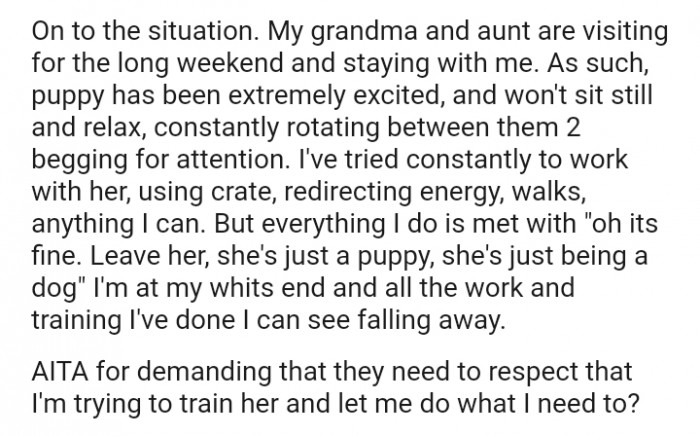
Redditors gave their verdict in the comments section, and we've gathered some of them for you to read through below.
She's absolutely adorable

Putting the pup in a crate with a Kong
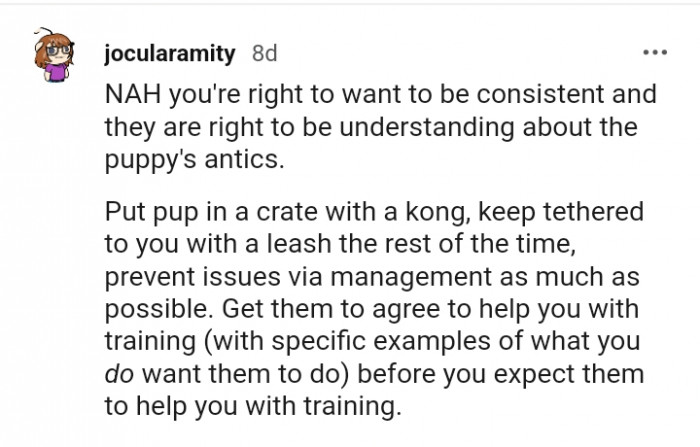
Behavioral psychologists emphasize that training should be based on mutual understanding and respect for each person's approach. A study in the Journal of Applied Animal Welfare Science suggests that collaborative training efforts can enhance the effectiveness of the methods used, leading to better outcomes for both the dog and the family.
Encouraging family discussions about training strategies can facilitate a more harmonious environment, reducing conflict and promoting shared responsibility.
Dr. Mark Stevens, a psychologist specializing in animal behavior, emphasizes the importance of consistent training methods. His work shows that when family members disagree on training approaches, it can confuse the puppy and impede its learning process.
Establishing a unified training strategy is essential for effective puppy care and maintaining harmony within the family.
You could leave him on the porch with no leash

Dogs her age soak up attention like a sponge
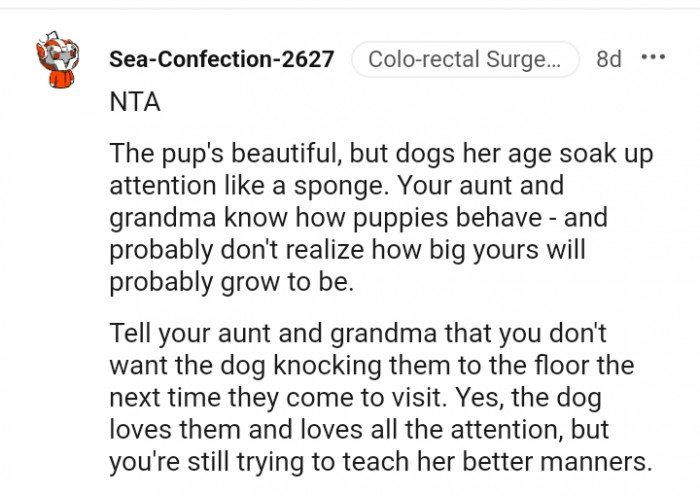
This Redditor usually gives their dog a highly favored item when people come over

The Importance of Assertiveness in Family Dynamics
Assertiveness is a critical skill in navigating family dynamics, especially when expressing concerns about pet training. Research from Dr. John Gottman highlights that assertive communication can significantly enhance relationship satisfaction.
Encouraging the Redditor to express her training preferences respectfully can help facilitate constructive conversations within the family. This approach not only benefits her but can also positively influence family dynamics.
The Importance of Consensus in Pet Training
When families bring home a new puppy, establishing a consensus on training methods can reduce conflict and enhance the pet's learning experience. Studies show that inconsistency in training can lead to behavioral issues and frustration among family members.
Creating a plan that involves all family members can foster cooperation and improve the puppy's development.
Do not feel so hopeless about it

This Redditor doesn't know how psychologically healthy it is to teach them not to walk up to people for pets
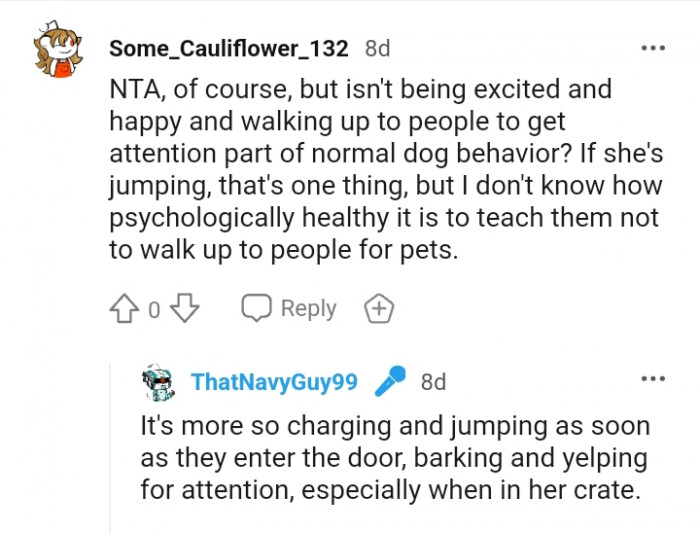
It also keeps them safe when out in the world

Practical solutions may include setting aside time for family meetings where each member can share their thoughts on training methods. This structured approach can foster open dialogue and ensure everyone feels heard and valued. Additionally, employing techniques like active listening can enhance understanding and empathy within the family.
Collaborative decision-making allows for shared responsibility and can lead to more effective training outcomes.
From a behavioral perspective, puppies thrive in environments where their training is consistent and predictable. According to research, positive reinforcement strategies are most effective when all caregivers apply them uniformly.
Encouraging open discussions about training methods can lead to a more cohesive approach and prevent confusion for the puppy.
You are doing what's best for your dog

This Redditor needed information, and it was supplied by the OP
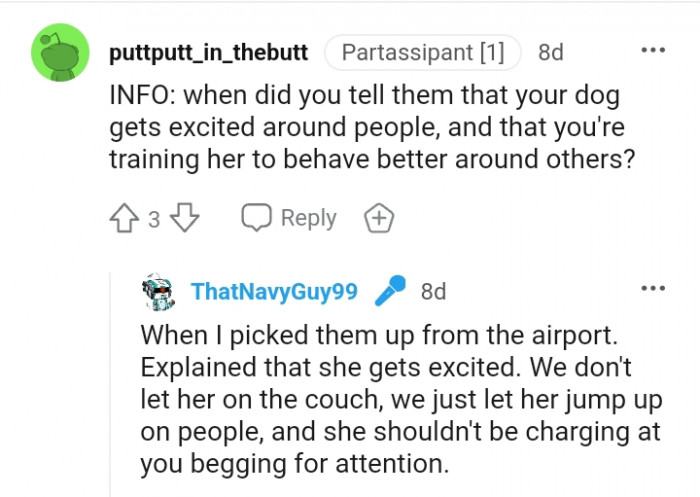
They get a free pass the first time
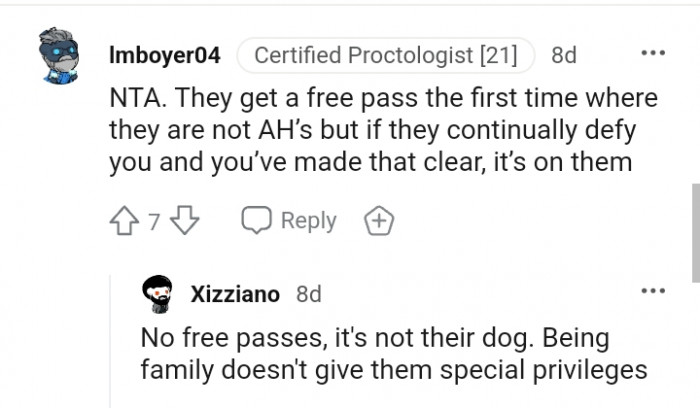
Navigating Conflicts in Training Philosophies
Conflicts in training philosophies can arise when family members have differing approaches. Dr. Lawrence Cohen, a child psychologist and author of "Playful Parenting," emphasizes that "open communication is crucial in resolving family disagreements, especially when it comes to shared responsibilities like puppy training." Addressing these conflicts early can prevent escalation and foster healthier relationships. In this situation, the Redditor's feelings about her training methods can be addressed through open dialogue and clarification of family roles. Encouraging all family members to participate in discussions about the puppy can help alleviate feelings of resentment and promote unity. For more insights, visit playfulparenting.com.
Practical Strategies for Collaborative Training
To promote effective training, families can schedule regular training sessions that include all members. Research from the Journal of Veterinary Behavior indicates that joint training efforts can enhance the puppy's socialization and understanding of commands.
Engaging in training as a family can also strengthen bonds among members and reinforce the importance of teamwork.
Dogs thrive in an environment where the owner is the master
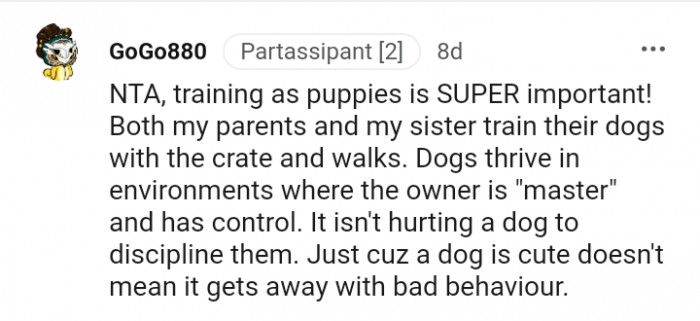
In puppies, attention-seeking dog behavior is typical and acceptable. It is a completely natural survival strategy for puppies who are solely dependent on their mother for care.
They will still be learning right from wrong and will adore playing with their littermates. It also gives us a feeling of accomplishment and provides us with a method to communicate with our canine family members.
Drop your thoughts about this story in the comments below.
Utilizing a family training journal can be another effective method for ensuring consistency. By documenting progress and challenges, families can hold each other accountable and celebrate successes together.
Psychologists recommend this approach as it encourages communication and cooperation in the training process.
Building a Supportive Training Environment
Creating a supportive environment for a new puppy involves acknowledging each family member's perspective and fostering collaboration. Research indicates that pets benefit emotionally from stable and harmonious households.
Encouraging family discussions about the puppy's needs can lead to better care and a more fulfilling experience for everyone involved.
Psychological Analysis
This scenario reveals the complexities of family dynamics when it comes to pet care. Often, differing opinions can create tension, making it crucial for families to establish a collaborative approach to training that respects everyone's input and fosters teamwork.
Analysis generated by AI
Analysis & Alternative Approaches
In conclusion, effective puppy training requires collaboration and open communication among family members. By fostering a unified approach, families can enhance the training experience for both the puppy and themselves.
It's also essential to recognize the emotional labor involved in family dynamics. Acknowledging that everyone has different perspectives and feelings about training can foster empathy. According to studies in social psychology, understanding diverse viewpoints can enhance relational harmony and reduce conflict.
Encouraging a culture of patience and understanding can facilitate healthier family interactions.
The Emotional Effects of Exclusion
Feeling excluded from decisions about a family pet can lead to feelings of anger and frustration. Research in emotional psychology indicates that when individuals feel their contributions are not valued, it can result in emotional withdrawal and increased conflict.
In the Redditor's case, her feelings of exclusion from the puppy training decisions may lead to resentment towards her family. Addressing these feelings openly can empower her to express her needs more effectively.
Finally, fostering a culture of shared responsibility within the family can alleviate feelings of exclusion. Encouraging family members to participate in decisions related to the puppy can create a sense of unity and shared purpose. Studies show that collaborative decision-making enhances family cohesion and satisfaction, ultimately benefiting everyone involved.
Working together to navigate challenges can strengthen family bonds and promote emotional well-being.
Analysis & Alternative Approaches
In conclusion, addressing conflicts in pet training philosophies through effective communication and assertiveness is essential for fostering healthy family relationships. As noted in psychological research, open dialogue and collaboration can enhance family cohesion and satisfaction.
By creating an inclusive environment where all voices are heard, families can navigate challenges together, ultimately benefiting everyone involved.



